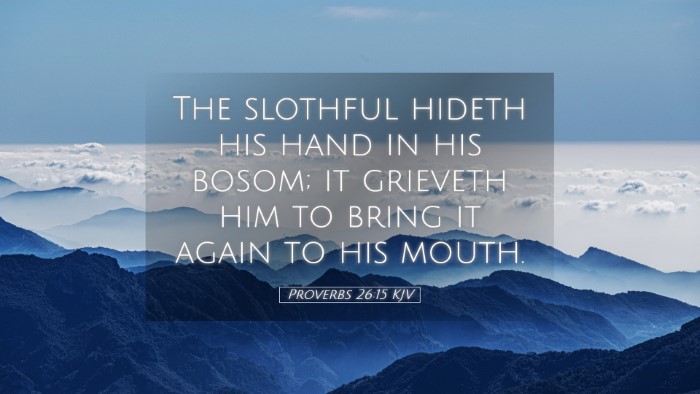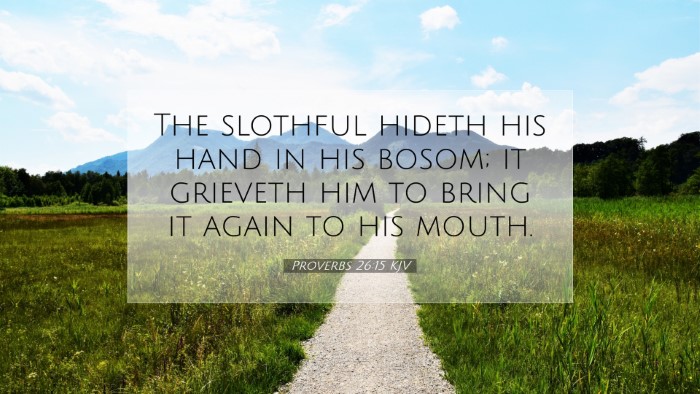Commentary on Proverbs 26:15
Proverbs 26:15 reads: "The slothful hideth his hand in his bosom; it grieveth him to bring it again to his mouth." This verse serves as a vivid illustration of slothfulness and its implications.
Overview of Slothfulness
This proverb succinctly encapsulates the essence of laziness. The imagery presented in this verse reflects the mental resistance and physical lethargy characteristic of the sluggard.
Matthew Henry's Commentary
According to Matthew Henry, slothfulness is depicted as a man who is so lazy that he cannot bring his hand to his mouth. He notes that the slothful person is not just unproductive; he is emotionally impacted by even the effort of feeding himself. This exaggeration highlights the extent to which laziness can dominate one's life.
Henry explains that the 'bosom,' representing comfort or security, becomes a trap for the lazy person. Instead of taking the initiative to eat, the slothful man prefers to hide away in comfort, reflecting a broader aversion to engaging in productive labor.
Albert Barnes' Insights
Albert Barnes further expounds on the critical nature of work ethic in this passage. He argues that the lazy individual experiences grief at the mere suggestion of effort. Barnes interprets the act of bringing food to the mouth as essential for survival, thus illustrating that even the most basic human needs are neglected by the idler.
Moreover, Barnes emphasizes that true wisdom involves recognizing the importance of diligent work. He insists that this verse serves as a warning to those who seek comfort without effort, pointing to the broader principle that labor is a virtue while idleness is a vice.
Adam Clarke's Reflections
Adam Clarke approaches the verse by analyzing the condition of the slothful. He suggests that the 'hand' represents the individual's capacity to work or to engage in action. Hiding it in the bosom signifies a refusal to engage actively in one’s own sustenance. Clarke argues that the sluggard's reluctance manifests not just physically but also in a spiritual sense, whereby the individual deprives themselves of the fruits of their labor.
Clarke adds that the slothful often rationalize their inactivity with various excuses, creating a cycle of procrastination. He posits that this behavior can be detrimental not only to the lazy individual but also to those around them, pointing to a communal responsibility to foster diligence and work.
Theological Implications
The implications of Proverbs 26:15 extend beyond mere exhortation against laziness; they engage with fundamental theological concepts associated with work and morality.
- Work as Divine Calling: The Christian understanding of work is deeply rooted in the theology of creation. God designed humanity to labor, reflecting His own creative activity. Laziness, therefore, stands in opposition to this divine model.
- The Virtue of Diligence: Diligence is often extolled in Scripture as a virtue aligned with godliness. Proverbs repeatedly encourages a diligent spirit, reinforcing the importance of responsibility and stewardship of one's gifts and opportunities.
- Consequences of Idleness: The proverb warns that the lifestyle of idleness carries significant consequences. Lack of labor not only leads to poverty (as seen throughout Proverbs) but also to spiritual stagnation, undermining one's relationship with God.
Practical Applications
For pastors and church leaders, Proverbs 26:15 offers rich material for teaching on work ethic and personal responsibility. Consider using this proverb in sermons or Bible studies to address:
- Encouraging Work Ethic: Implement discussions around the significance of hard work and dedication in both secular and spiritual contexts.
- Identifying Laziness: Help congregants acknowledge areas of idleness in their lives and encourage practical steps toward engaging in productive work.
- Building a Culture of Service: Promote a church environment where service and work are valued, and where members participate actively in community outreach and support for one another.
Conclusion
Proverbs 26:15 serves as a profound reminder of the dangers of slothfulness. Through the lens of Matthew Henry, Albert Barnes, and Adam Clarke, we gain a deeper understanding of the implications of laziness, the importance of diligence, and the necessity of engaging responsibly in both personal and communal endeavors.
Ultimately, committing to active living in all aspects—spiritually, emotionally, and physically—not only fosters personal growth but also enhances the collective wellbeing of the Christian community.


